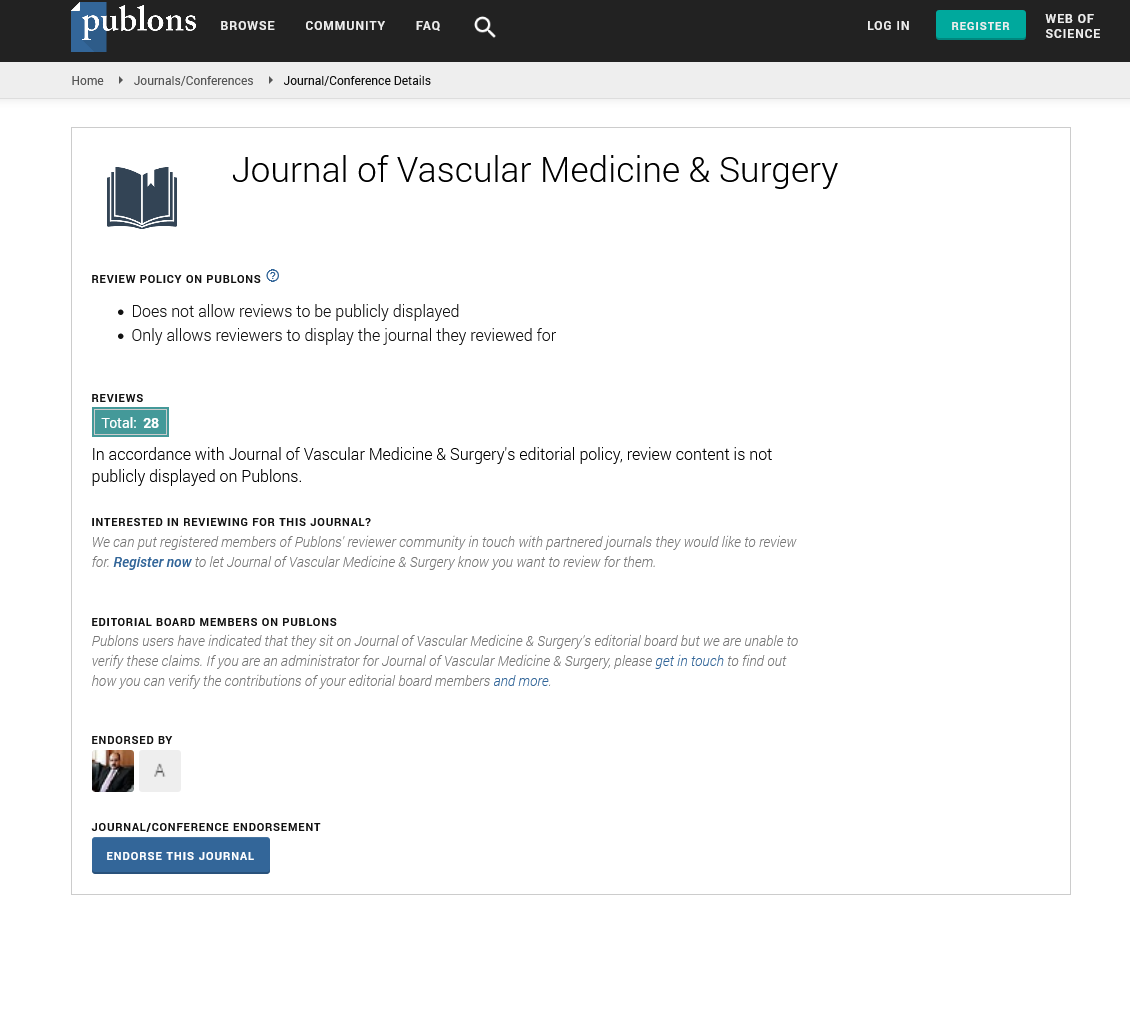Indexed In
- Open J Gate
- Academic Keys
- RefSeek
- Hamdard University
- EBSCO A-Z
- OCLC- WorldCat
- Publons
- Euro Pub
- Google Scholar
- SHERPA ROMEO
Useful Links
Share This Page
Journal Flyer

Open Access Journals
- Agri and Aquaculture
- Biochemistry
- Bioinformatics & Systems Biology
- Business & Management
- Chemistry
- Clinical Sciences
- Engineering
- Food & Nutrition
- General Science
- Genetics & Molecular Biology
- Immunology & Microbiology
- Medical Sciences
- Neuroscience & Psychology
- Nursing & Health Care
- Pharmaceutical Sciences
Perspective - (2023) Volume 0, Issue 0
Significance of Vascular Dementia and its Treatment Methods
Prajjwal Marsool*Received: 04-Apr-2023, Manuscript No. JVMS-23-21325; Editor assigned: 06-Apr-2023, Pre QC No. JVMS-23-21325 (PQ); Reviewed: 21-Apr-2023, QC No. JVMS-23-21325; Revised: 28-Apr-2023, Manuscript No. JVMS-23-21325 (R); Published: 08-May-2023, DOI: 10.35248/2329-6925.23.S15.513
Description
Dementia is a group of symptoms that associated with an improvement in cognitive function, such as memory, language, problem-solving, and other developing abilities. It is a type of dementia that is caused by reduced blood flow to the brain.
Causes of vascular dementia
Vascular dementia is caused by damage to the blood vessels that supply blood to the brain. This damage can be caused by a variety of factors, including high blood pressure, high cholesterol, diabetes, smoking, and heart disease. When the blood vessels in the brain are damaged, they can become blocked or narrowed, leading to a reduction in blood flow. This reduction in blood flow can cause damage to the brain cells, resulting in cognitive decline and the development of vascular dementia.
Symptoms of vascular dementia
The symptoms of vascular dementia can vary depending on the severity of the condition and the location of the damage to the brain. However, some common symptoms include:
Memory loss: Vascular dementia can cause problems with memory, particularly in the early stages of the condition.
Confusion: People with vascular dementia may become easily confused, particularly when trying to navigate new environments or carry out difficult tasks.
Difficulty with language: It can cause language problems, such as difficulty finding the appropriate words or understanding language when spoken or written.
Impaired judgment: People suffering from vascular dementia can find it difficult to make decisions or solve problems.
Changes in mood or behavior: It can cause changes in mood or behavior, including depression, anxiety, irritability, or apathy.
Problems with movement: Vascular dementia can cause problems with movement, including difficulty walking, coordination problems, or tremors.
Diagnosis of vascular dementia
The diagnosis of vascular dementia typically involves a combination of medical history, physical examination, and cognitive testing. Medical history can help to identify any risk factors that may have contributed to the development of the condition, such as high blood pressure, high cholesterol, or diabetes. A physical examination can help to identify any underlying health conditions that may be contributing to the symptoms. Cognitive testing can help the severity of the cognitive decline and identify any areas that are particularly difficult, such as memory, language, or problem-solving. In some cases, additional tests may be necessary, such as brain imaging tests such as Magnetic Resonance Imaging (MRI) or Computed Tomography (CT) scans. These tests can help to identify any damage to the blood vessels in the brain and helps in determining the severity of cognitive decline.
Treatment methods of vascular dementia
There is currently no cure for vascular dementia, and treatment focuses on managing the symptoms and preventing further cognitive decline. Some common treatments for vascular dementia include:
Medications: There are several medications that can help to manage the symptoms of vascular dementia, including medications to control high blood pressure or high cholesterol, antidepressants, or medications to improve memory and cognitive function.
Improvements in lifestyle: Establishing dietary changes, exercise, and other lifestyle factors can help to manage the symptoms of vascular dementia and reduce the risk of further cognitive decline. For example, avoid smoking, reducing alcohol consumption, and eating a healthy diet all can help to improve vascular health and reduce the risk of further damage to the brain.
Therapy: Cognitive-behavioral therapy or other types of therapy can help people with vascular dementia manage the emotional and behavioral symptoms associated with the condition.
Supportive care: In some cases, people with vascular dementia may require supportive care, such as assistance with daily activities.
Citation: Marsool P (2023) Significance of Vascular Dementia and its Treatment Methods. J Vasc Surg. S15:513.
Copyright: © 2023 Marsool P. This is an open access article distributed under the terms of the Creative Commons Attribution License, which permits unrestricted use, distribution, and reproduction in any medium, provided the original author and source are credited.

